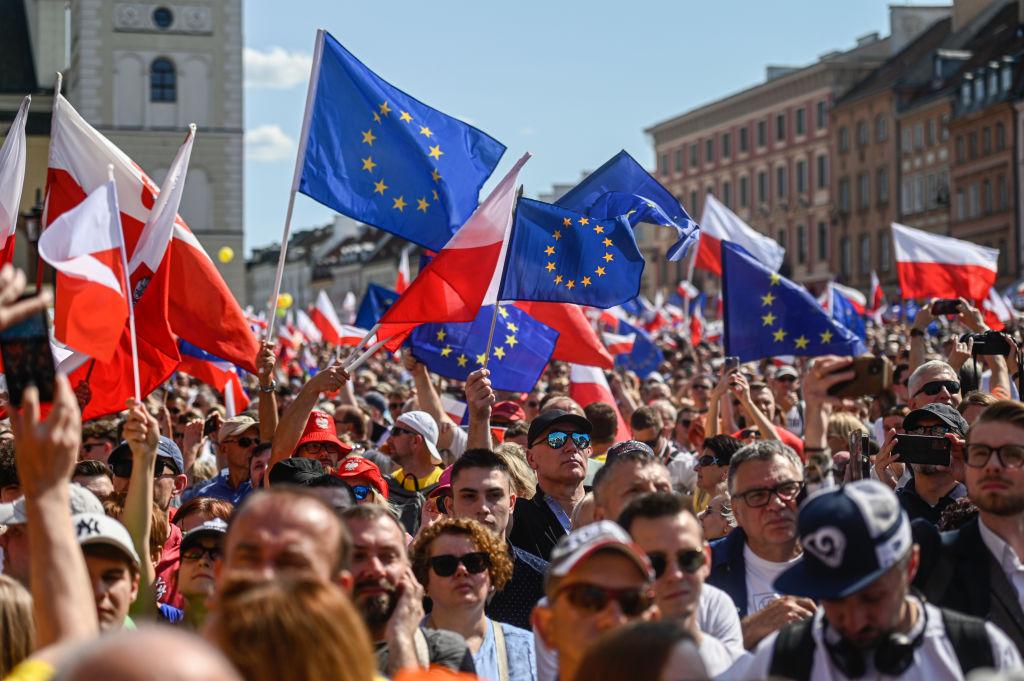
The results of the recent elections in Poland and Slovakia underscore the two countries’ diverging political trajectories. In Poland, the democratic opposition won enough parliamentary seats to oust the increasingly authoritarian Law and Justice (PiS) party. While Polish President Andrzej Duda gave PiS Prime Minister Mateusz Morawiecki the first shot at forming a government, the opposition parties have already announced a coalition deal.
Meanwhile, in Slovakia, the left-wing populist party Slovak Social Democracy (Smer), led by former prime minister Robert Fico, eked out a narrow victory, setting the stage for a possible return to kleptocratic rule.
Both elections generated record-high turnout. In Poland, nearly 73% of eligible voters cast ballots—the highest rate since the fall of communism. Slovakia’s turnout, at 68.5%, was the country’s highest since 1998.
If the opposition Civic Platform, led by former prime minister Donald Tusk, succeeds in forming Poland’s next government, it will face the challenge of curtailing populism at home, embodied by a president elected by PiS. When it comes to foreign policy, a Tusk administration would bolster diplomatic support for Ukraine and focus on mending ties with the European Union, especially with key members such as Germany and France. Poland’s return to the democratic fold will rehabilitate its international image and strengthen its influence in Europe.
By contrast, Fico’s return to power in Slovakia raises significant concerns for two main reasons: his aspiration to mirror Hungarian Prime Minister Viktor Orban’s strategy of consolidating control over the state and its key institutions, and Slovakia’s likely departure from its erstwhile Western-oriented foreign policy.
Fico’s first directive—halting arms shipments to Ukraine—was more symbolic than consequential. Slovakia had largely depleted its stockpiles and sent everything it could to Ukraine. Nevertheless, Fico’s pro-Russia stance suggests that his new government will drag its feet on implementing new EU sanctions against Russia and may also seek to reopen defence agreements with the United States. In both cases, however, Fico will have to tread carefully, considering that Slovakia remains dependent on the EU’s cohesion funds and NATO’s security guarantees.
Given that Fico won the election by a razor-thin margin, his chances of replicating Orban’s illiberal model appear slim. Not only does Orban’s Fidesz Party have an absolute parliamentary majority, but his regime is underpinned by an authoritarian vision of a Christian nationalist–conservative state supported by a relatively homogeneous and compliant citizenry. By contrast, Fico has no clear vision for Slovakia beyond his own quest for power and personal enrichment. Moreover, his return to power signals the political comeback of his notorious associates Robert Kalinak and Tibor Gaspar, both of whom have been investigated for their alleged involvement in the 2018 assassination of investigative journalist Jan Kuciak and his fiancée, Martina Kusnirova.
In his public statements, Fico often oscillates between sounding like an anti-vaccine spokesperson, a pro-Kremlin parrot and an anti-NATO and anti-American mouthpiece—whatever extreme position happens to appeal to his embittered and alienated voter base. But his actions often betray his deference to the EU and NATO. Crucially, it was during his tenure as prime minister that Slovakia integrated closely with the rest of Europe, joining the Schengen area in 2007 and the eurozone in 2009. Fico even pushed for the country to join the ‘core EU’, placing it in stark contrast with the more Eurosceptic positions of its eastern neighbours. On other occasions prior to his re-election, Fico’s actions deviated from his public statements—for example, when he repeatedly called for lifting the energy, financial and defence sanctions the EU slapped on Moscow after it annexed Crimea, only to support them quietly in EU forums.
The Polish and Slovak elections offer valuable lessons for pro-democracy movements challenging populist regimes across Europe. Poland’s experience demonstrates the effectiveness of uniting a diverse coalition of democratic forces—progressives, leftists, technocrats, traditionalists and conservatives—around a common cause. By focusing on PiS’s concentration of power, its attacks on the judiciary and the media, and its crackdown on civil rights, the opposition was able to illustrate the stakes of the rapid erosion of Polish democracy.
While PiS manipulated election laws, milked state-owned companies for campaign funds and even turned its back on Ukraine just to gain an electoral edge, the Civic Platform–led alliance managed to put aside its differences in an effort to level the playing field. In the end, that strategy proved successful.
The key takeaway from Slovakia’s election has little to do with Fico. While pro-democratic liberals led by Michal Simecka performed exceptionally well in urban centres such as Bratislava and Kosice, and among Slovak expatriates, their message failed to resonate with the rest of the country, particularly in rural areas and among senior citizens and those who felt abandoned by the political establishment. Unless centrist politicians address the concerns of these groups, disaffected voters will remain vulnerable to disinformation and the allure of populism.
Following Poland’s rejection of illiberalism, Fico’s Slovakia has become Hungary’s closest EU ally. But while the Slovak–Hungarian alliance may pose some challenges for the EU and NATO, the strength of the illiberal coalition and its ability to sow division in Europe is significantly diminished without Poland. One reason for this is that while the Orban administration hopes for rapprochement between the two countries on strategic issues, such as support for Ukraine and migration or nuclear policy, he doesn’t trust Fico in the same way that he trusts PiS leader Jaroslaw Kaczynski, his close political ally. Following the European Socialists’ suspension of Smer from its ranks, Fico, too, won’t waste precious political capital on alliances that may hurt his standing. If anything, deals will tend to get done behind closed doors.
With Europe’s illiberal governments in a weakened state, the EU must fulfill its promise to crack down on them. The bloc’s financial resources confer significant power. It must use this leverage to uphold democracy while it has the chance.